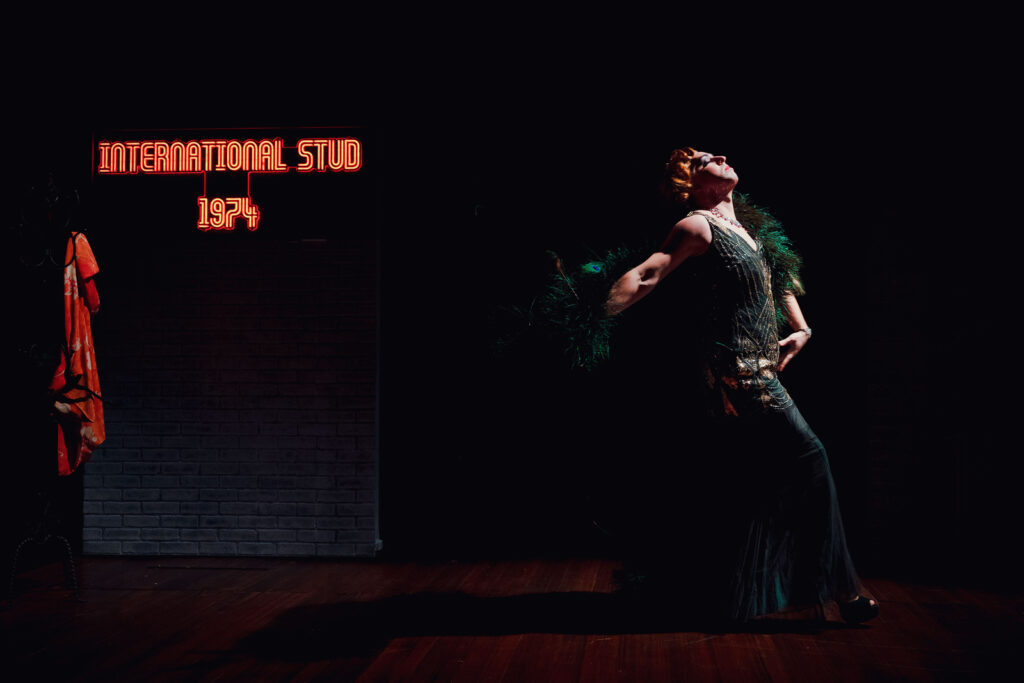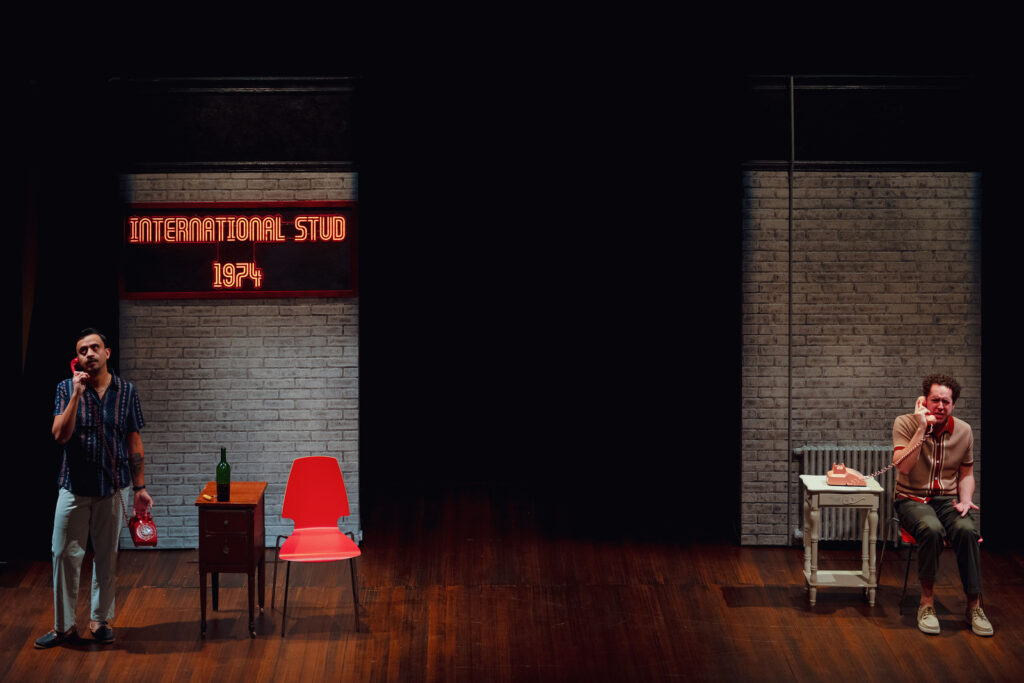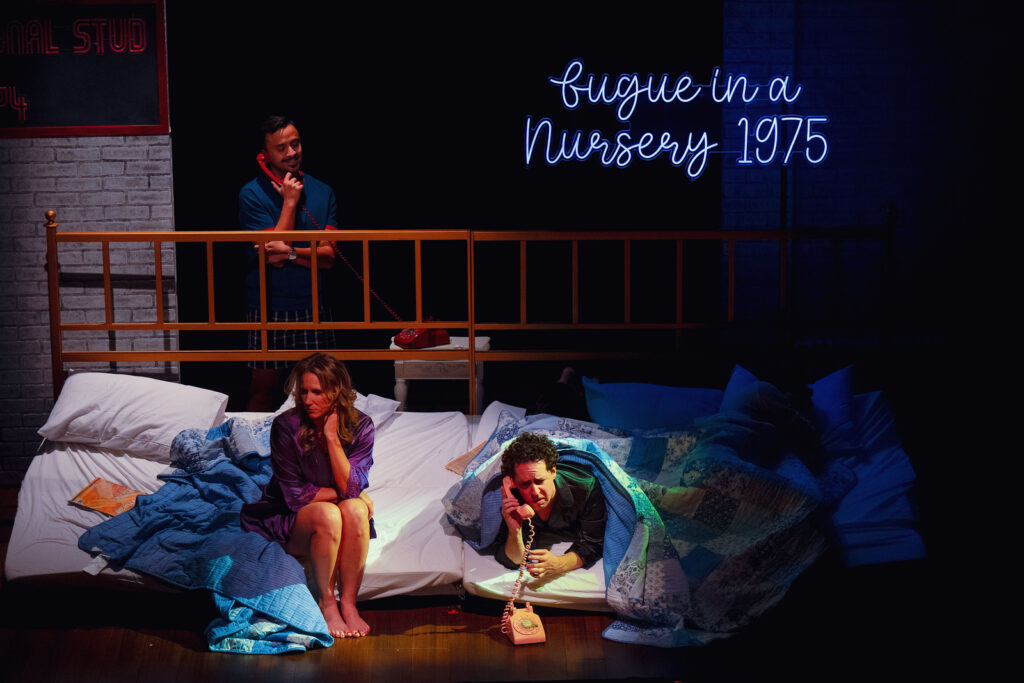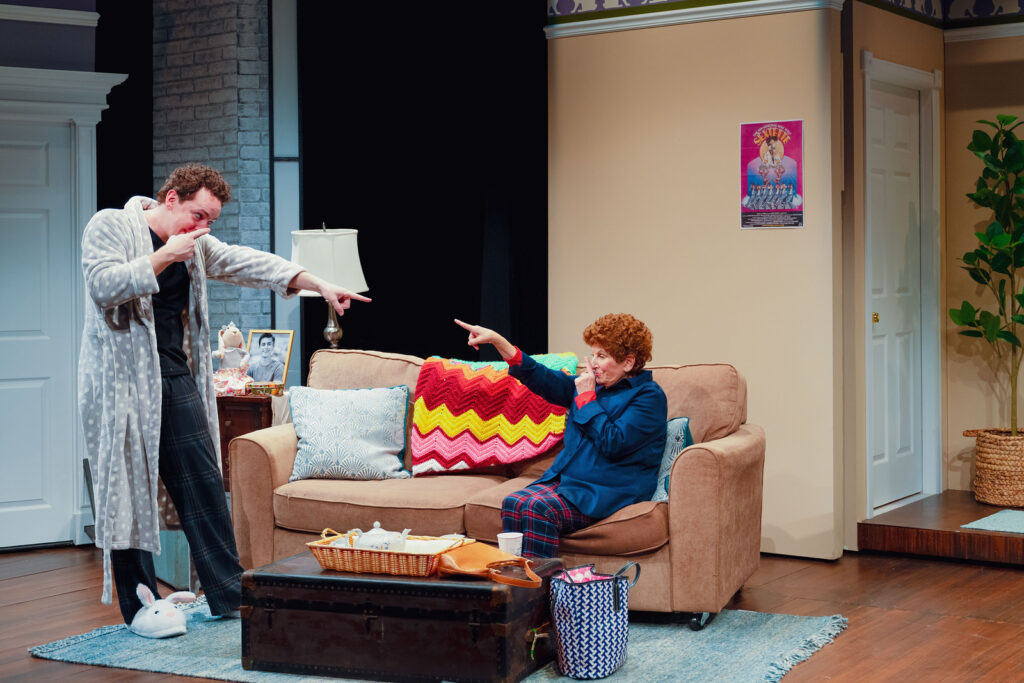
Torch Song – Written by Harvey Fierstein. Presented by Moonbox Productions. Producer, Sharman Altshuler; Director, Allison Olivia-Choat; Set Designer, Cameron McEachern; Lighting Designer, Finn Bamber; Costume Designer, Joe Michienzie, Sound Designer, Aubrey Dube; Props Designer, Addie Pates. At Calderwood Pavilion, Roberts Studio Theater, Boston, through December 23rd.
by Linda Chin
Legendary storyteller Harvey Firestein’s semi-autobiographical Torch Song Trilogy, a trio of one-acts chronicling the life of gay, Jewish protagonist Arnold Beckoff, a drag queen in 1970s New York City, made their Broadway debut in 1982 and earned two Tony Awards for Best Play and Best Actor. The 1983 ceremony hinted at the closeted culture of the time, when homosexuality was a taboo topic for public discussion. Presenter Diahann Carroll’s scripted note cards described nominee Torch Song Trilogy as a “devastating comic play…about the merciless mayhem that love wreaks,” and when producer John Glines wrapped up his acceptance speech by acknowledging the support of his male partner and lover, the broadcast moved swiftly to a music/commercial break (Had the internet existed “back then” it surely would have broken).
When accepting the award for his brilliant portrayal of Beckoff, the 29 year-young and beautiful Harvey Fierstein began by assuring audiences that he wasn’t going to say anything outrageous or embarrassing. He was properly coached (by colleague Chita Rivera) on what not to say on stage, and being properly raised, he graciously started by thanking his mother with a big Hi Ma! and happy wave, then the producers, castmates, designers, dressers, and audience. Torch Song Trilogy enjoyed a successful run for over three decades, but for its 2018 Broadway revival, Firestein cut the original production’s four-hour running time significantly and retitled it as simply Torch Song. The new title’s ode to ballads, performed by singers lamenting lost love, is highly appropriate, as Arnold’s lifelong quest is for love, and to be loved. He wants to be in a long-term, committed relationship, to have an extended family, and to be accepted and respected by his mother. The desire to love – and to be loved – is universal, and theatergoers will find it in Moonbox’s Torch Song.

Each of Torch Song’s three acts takes place during a different phase of Beckoff’s life, is set in a different location; a neon sign with the Act’s title is part of the stage picture. Designers Cameron McEachern (Set), Finn Bamber (Lighting), Joe Michienzie (Costume), Audrey Dube (Sound), and Addie Pates (Props) have blended their strong design aesthetic to create the various worlds that the exceptional ensemble of six actors will bring to life. Act One, The International Stud (1974), takes us into the dressing room where Arnold (Peter Mill) transforms into a drag queen and the backroom of a bar where men have anonymous sex. Arnold meets Ed Reiss (Christian Mancinas-Garcia), a bisexual teacher who becomes his lover. Audience members may connect with Arnold’s “Why Don’t You Love Me Anymore?” call, as I did.
In Act Two, Fugue in a Nursery, a year later (1975), two couples gather in the country for a summer weekend – Ed now with Laurel (Janis Hudson), and Arnold with his new young lover Alan (Jack Manning). Much of the action takes place in a giant bed big enough for four, and there is even a roll in the hay in a barn on the property.

Five years later in Act Three, Widows and Children First (1980), two characters who have been alluded to previously make their appearances in Arnold’s apartment – the teenage David (Jack Mullen), a gay foster-child who has been living there for years, and fresh off the plane from Florida, his mother (Bobbie Steinbach), who is not aware of the new member of the Beckoff family.
Torch Song, with a run time of two hours and forty-five minutes, is thoroughly engaging, a testament to Allison Choat’s direction and strong casting choices. Fierstein has populated his play with characters young and old, homosexual, bisexual and straight and a full palette of emotions. True to its billing, Torch Song is hilarious and heartwarming throughout. Arnold’s opening soliloquy (when he lists various drag queen stage names – his handle is Virginia Ham) and back room hookup (which ends without Arnold learning his partner’s name) showed Mill’s star power and made me laugh and cry. Making her Moonbox debut, beloved Boston actor Bobbie Steinbach’s portrayal of Arnold’s Ma was spot-on and familiar, reminding me of the many New York Jewish mothers of that era that I’ve known and loved. Steinbach and Mill’s mother-child affection for each other, arguments with each other were so poignant, and scenes where Steinbach takes Mullen (her grandson-to-be, a Boston Conservatory student) under her wing so giving, that I will take the liberty of renaming Act Three “Ma’s Master Class.”

One of the play’s most heartbreaking moments was the disclosure that a gay man was beaten to death by a group of homophobic boys, an act of senseless violence that unfortunately adds to the play’s relevance to contemporary audiences. With the innumerable losses, and society or self-imposed isolation we have all experienced in recent years, Torch Song may offer some healing properties. Ma’s motherly words about the pain of losing a loved one never going away: “You get used to it. And it’s good,” and “It’s good because it makes sure you don’t forget” is advice worth remembering. And, echoing the words of Harvey Fierstein, “any little thing that makes you feel less alone,” “a line that reaches out and touches something going on inside of you. And for that instant you are relieved of the isolation” speak volumes about the power of plays. For tickets and information, go to: https://moonboxproductions.org/

